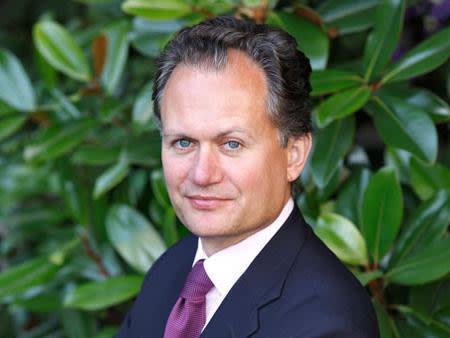After a strong run for equities in the 1980s and 1990s, Richard Buxton had a conviction that sideways markets might be the shape of things to come - for the next 15 years. So, after joining Schroders in 2001, he helped create the Schroder UK Alpha Plus Fund to do something different. Many funds around the turn of the millennium were similar to the index, typically with a tracking error of around 4 per cent.
"I thought that I would concentrate on money making ideas in a tough environment, which are typically less. We could also have a tracking error of up to 10 per cent.
We chose to focus on large caps that many think are slower growing. While this is true to a certain extent, the differential between FTSE 100 winners and losers is enormous, and focusing on large caps means you can build a scaleable fund, which means we have no problems adding or subtracting value."
Mr Buxton's plan has paid off: the UK Alpha Plus Fund, as it is called, has returned more than 150 per cent since launch, in contrast to the FTSE All-Share which has returned just under 83 per cent.
However, this is not without considerable volatility, as you would expect from a fund that does not seek to replicate the index and only holds around 38 stocks, as "in a market with little direction you must focus on a smaller number of potential winners".
So, while long-term numbers are good, shorter-term returns can lag the index. "I have had extended periods of fabulous returns and periods with not such good returns," says Mr Buxton. "If you don't track an index you will be some way away from it, and equities are an investment that should have a three- to five-year time horizon as over time you should get it right."
The record for one of Mr Buxton's other mandates, the Schroder UK Growth investment trust, is not so strong over longer periods, although over three years it is well ahead of the FTSE All-Share and pretty much every other UK growth investment trust.
"The five years plus numbers are not so good because of the policy of gearing [taking on debt]," he says. "The board's view was that in the long-term equities go up, so having around 15 per cent gearing would pay off. But during the worst of the financial crisis (late 2008 and early 2009), whereas UK Alpha Plus was using its cash to invest in lows, the investment trust's gearing rose and breached bank covenants, so to pay this down it was a forced seller of the stocks UK Alpha Plus was buying.
"At the beginning of 2009 the board agreed that I could be more tactical with the gearing and I have since been trying to get back underperformance. If the market is going up gearing is down and if it is going down gearing is up."
The trust's gearing was 11 per cent as at the end of May.
Richard Buxton
The good things come to those who wait
Part of the reason Mr Buxton likes to have a three- to five-year outlook is because he likes to take time buying and selling. The fund generally has a very low turnover, with Mr Buxton only typically buying and selling two or three companies a year. Shares that have been worth the wait include Debenhams and Taylor Wimpey, bought in 2010 at ever decreasing prices. "It was not because I thought the UK economy and consumer would bounce back, but because the shares were so cheap and these companies had mended their balance sheets and seemed able to drive profits forward in a difficult environment," he says. "They didn't do much in 2010 but in the last six months we have seen a market reaction to profits."
Another share that has benefited the portfolio since it was bought three years ago is Tate & Lyle. "I loved to hate this company for 20 years but a new manager (Javed Ahmed) came in from Reckitt Benckiser and we bought the share on what they said they could do in five years. Tate & Lyle has gone up a lot and has more to go. This is a classic example of what we are looking for."
Management is important: if Mr Buxton and his team lose confidence in this they sell the stock. "For example, after seven years of happy ownership I lost confidence in the managers at Tesco and sold it in 2010."
Mr Buxton has also bought bank shares. "I bought these because their recovery is a multi-year process of six years plus. In the three years since I have bought them, they have made a lot of progress in terms of deleveraging. We benefited from holding them during the 2009 market rally but they went against us last year because of the European financial crisis. Quite simply, I buy on bad days and let them rally on the good days. I bought more Barclays shares after Bob Diamond resigned because I think this is a catalyst for change. There is a risk of class actions against the bank but proving what took place is difficult and these would be multi-year actions."
A popular line with many UK fund managers is that, although they buy shares listed in the UK, you are actually buying into global growth as around 70 per cent of the FTSE 100's earnings come from abroad. "I am not opposed to having more of my portfolio companies' earnings coming from abroad," says Mr Buxton. "That said, you can find UK-focused companies that continue to execute extremely well, examples being Next and Whitbread, which has recently hit a new share price high."
After all, valuations are the key to future returns - not the economic outlook.












